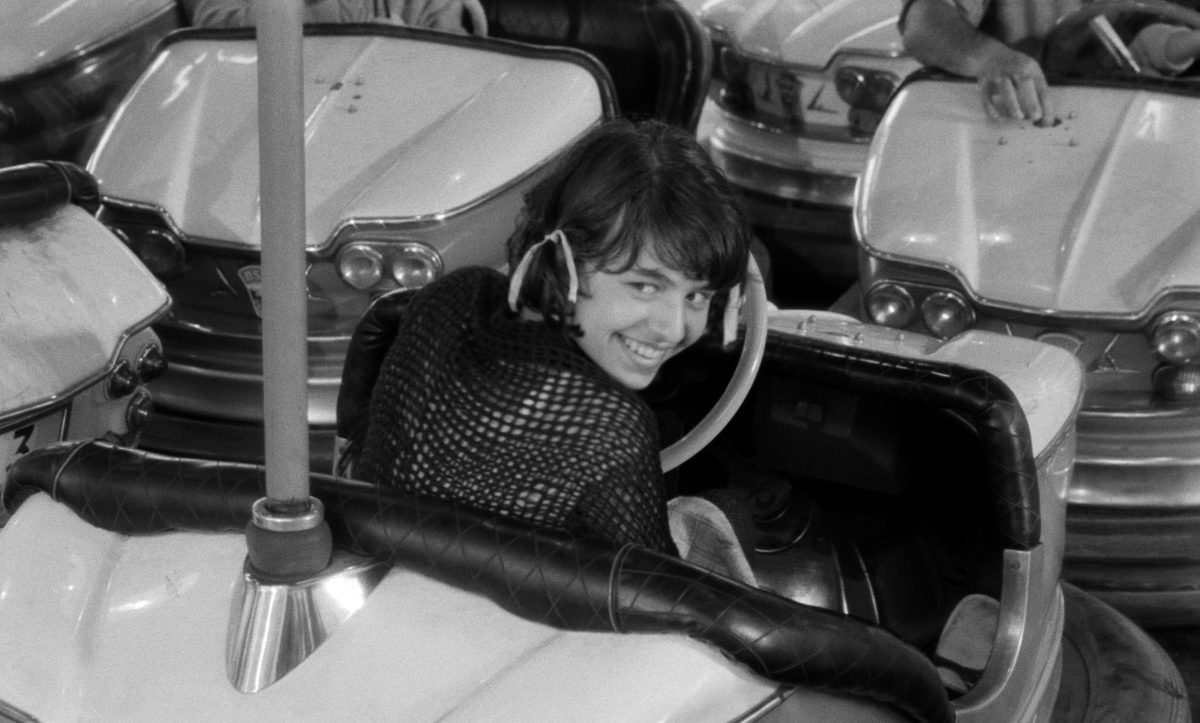Right now, the earth is full of refugees, human and not, without refuge.
— Donna Haraway, Staying with the Trouble (2016)
Of Balzac it has been written, by Roberto Calasso if I am not mistaken, that the whole of La Comédie humaine has been grown under the brilliant sun of one man by the name of Napoleon. The feat he pulled off by becoming the Emperor of France even though he came from rather humble beginnings, sent waves through a landscape that had been mostly immobile. The cluster of Balzacian stories in which men come to the city to try their luck, had been inconceivable before one man tried and made it all the way to the highest echelons. And yet it would still take a while for these ideas to become spread more widely and wildly through the events of May ’68.
The idea of leaving one’s native soil behind seems to be a very recent one and seems interwoven with the even more recent idea of new generations as ruptures with what came before. The idea of a young person having the freedom to define themselves cut loose from or in direct opposition with their lineage and tradition is not unproblematic. By using two films of the great French filmmaker Robert Bresson that have a lot of themes in common and narrative similarities, not in the least both of them ending with suicide, I want to delve deeper into this myth of freedom by dialectically opposing their two protagonists using the ideals of May ’68 as the tipping point that has been made of it.
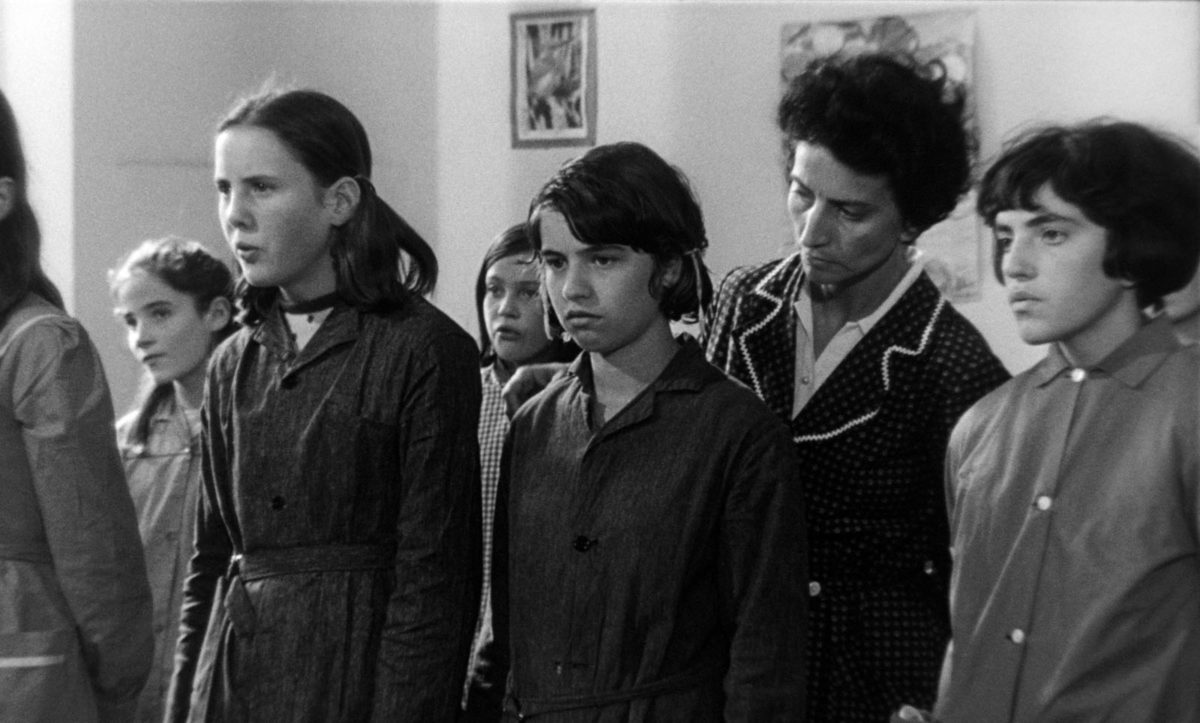
I. The Shoes of Mouchette
If the famous painting Shoes by Vincent van Gogh had the power of summoning up the whole world of which they were a part, the roads whereon and the sky where under they fulfilled their service, no less could be said of the shoes of little Mouchette (Nadine Nortier), the eponymous heroine in Bresson’s last film before what would become known as May ’68. The first thing we notice about this young woman, after she has been introduced to us by a classmate with the word of which we cannot be sure if it’s her given or nickname, are the sounds of her shoes, so distinctly different from the others girls, that you cannot help yourself being overcome with ruth, in all its biblical connotations.
The stumbling sound they make seems to be the soundtrack to a life of loneliness spent as an outcast amidst the villagers of a town somewhere in the backlands of France, that country that would soon explode but for now still lives in a tranquility close to stasis, the days following each other with the ruthless tempo of premeditated murder. There will be no escape for Mouchette, this has been made clear from the outset when, before the title credits, the mother, while sitting on a church stool, asks, “What will become of them without me?”, and by how the answer to this question feels like a stone right here in her chest. An image that will turn out to be a foreshadowing of this chronicle of a death foretold.
Before we meet the mother again and witness in what horrible circumstances this family makes an attempt at living, barely transcending survival, Mouchette is forced to sing a song of hope in choir class and unable to find the right notes, unable to attune herself to the rest of the more or less impeccably dressed girls, she starts crying silent tears. After class she throws rocks and mud at the other girls, trying to soil their pretty looking clothes. Mouchette is obsessed with dirt, the dirt she cannot escape, the dirt with which she wants to besmirch a world that looks down on her. If she sometimes resembles innocence herself it is an innocence that was belied by its surroundings. A tarnished angel if we ever saw one.
On a Sunday, strangely like the one in Tati’s Jour de fête (1949), we see the whole congregation drink before and after mass, the service itself tucked away inside an elliptic cut. There is a fair in town, an event that shakes the villagers out of their stupor and grants Mouchette a rare glimpse of happiness. While watching the bumper cars suddenly she finds herself on the receiving end of, what we could call with Maradona, the hand of God. A token has been granted to her by one of those hands that regularly penetrates Bresson’s screen to show us that human beings relate to their surroundings much more with these silly limbs than with intentions or feelings. Mouchette’s environment is shown primarily through the gaze of its inhabitants. We do not see the world, we are shown how they experience their world.
Riding bumper cars is not unlike finding your way through life. Constantly being pushed around, you try to figure out the instructions of the vehicle you were provided with and when you’ve finally learnt how to drive forward and bump flirtingly against that one boy that has been eyeing you the whole time, the ride is over. When Mouchette get berated by her drunk father, for not entirely clear reasons, you start to suspect that happiness seems to be a betrayal of the hand she has been dealt in life. The one-room shack she shares with her whole family, and wherein her bedridden mother lies ill, tells us all we need to know about what life has to offer Mouchette until the end of her days. She tries to manage this household to the best of her abilities, but she does it with the carelessness and brusqueness of the child that never had the opportunity to be just that.
Alcohol plagues this family, her father being a smuggler and quite the drinker himself. This is not the fancy Duras-alcoholism of “I drink in order not to kill myself” this is the much crueler, parochial drinking after the work is done and nobody has anything better to do than get wasted before the work seems undone again. At any point the villagers could burst out into a Satan’s tango. Alcoholism and its associated traumas are the inheritance of a people who have nothing else to leave their children. A prison of repetitiveness. The only possible escape is found in the smile of a boy or, as will turn out, the tears of a man.
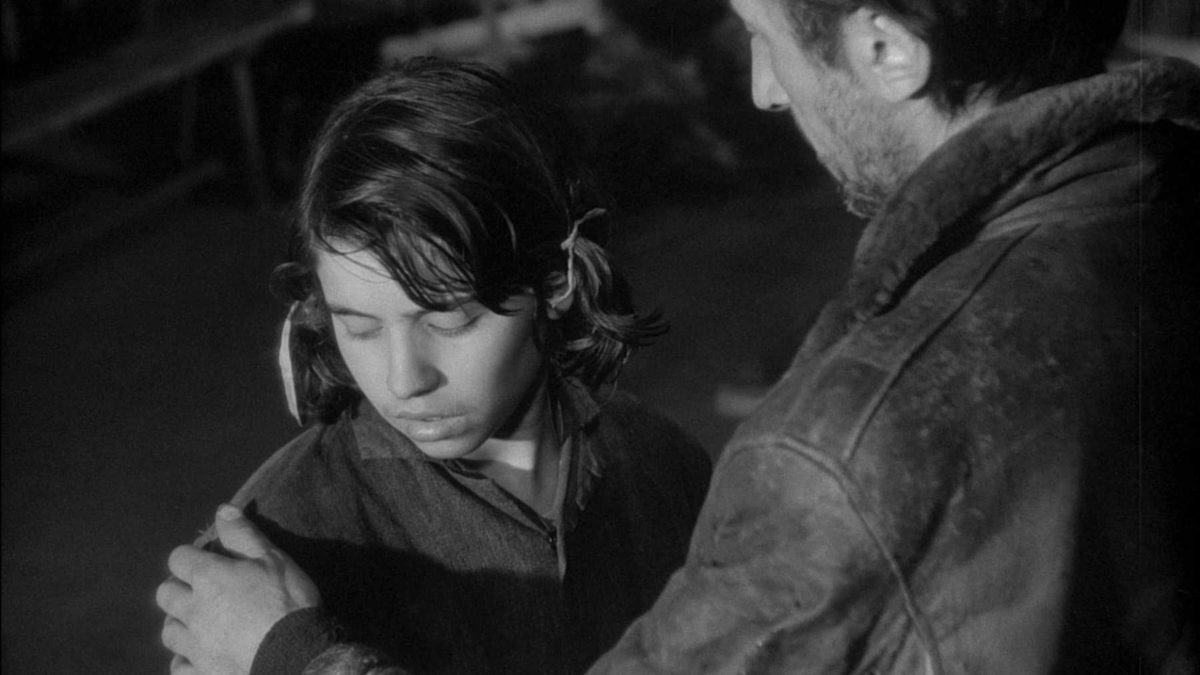
After another day wasted at school, Mouchette gets lost in the woods and surprised by a thunder storm. All though still in tune with nature—we get the sense people here still live according to the seasons—this also means it has not lost its power to frighten and devastate. Especially for a girl on the verge of womanhood, echoing Little Red Riding Hood. Just as her primordial predecessor, Mouchette will encounter a man in these woods, but he is not here to save her.
In the opening scenes we were introduced to a poacher and a gamekeeper spying on each other in a homosocial dance of pulling and hauling the objects of their desires and grievances. The bird getting caught by the first and released by the other no less the object of a contest in dominance as the bird working in the bar both of them try to seduce. While Mouchette is lost in the woods, the two men fight over their mutual love interest leaving the poacher Arsène to believe he killed the gamekeeper. Stumbling upon Mouchette he takes her into his cabin and tries to incriminate her in delivering an alibi for him. She agrees and yet will pay the price.
The reason why Mouchette, as much as it may sound like one, is anything but a cynical Von Trier-like pity party lies in the compassion of a director who does not judge his fictional children, which also means he will not deliver them to a cheap, sentimental redemption. Bresson is not a sentimentalist; his approach is one of observation and even though he has of course written the scripts, what plays out is less a narrative than the conjuring of a world. With all its inescapable tragedy, yes, but also with the possibility of tenderness, mostly in blink-and-you-will-miss-it moments.
When Arsène rapes Mouchette this is without a doubt one of the most horrible things to happen in my life. And yet, the way Mouchette clutches his back does not make it any less horrible, but shows she knows there is nothing more she could hope for. It is an excruciating moment of tenderness, a moment in which not only all hope, but the sheer idea of something as hope, of transcending this place seems ridiculous. Mouchette holds on to her life because what else could she do?
Returning home, for lack of better word, Mouchette tries to come clean to her mother but gets interrupted twice. First by the screams of the baby brother she has been assigned to care for (and who might eerily forebode what the future will hold for her) and the second time by her mother’s death, leaving her completely alone. She has one last trip to make, to the undertaker, which will bring her past every villager who will not give up the chance to demean her even more. This is not a place where she can stay, marked as she is by the scar of sin on her chest. She needs to leave and the only way out is the one her mother went before her.
It is of utmost importance to understand that Mouchette did not premeditated her suicide. Having retrieved the clothes in which her mother will be buried, she sits down to rest on the banks of a small river and only when she tears the white funeral dress—by accident!—does she see the water as a possible means of escape. She clumsily attempts a first time to roll into the water but halts before she makes it. Then she sees a farmer, tries to call him, but he neglects her. Just as thoughtlessly as she undertook that first attempt, she could have been saved by a random passerby. Yet his indifference solidifies her flimsy decision. She tries again and again and the third time she succeeds. Nothing has been redeemed by this meaningless act. Leaving this cruel world is as insignificant an act as staying there. We might have lost something, a possibility of our humanity but before the last ripples on the water have disappeared Mouchette already will have been forgotten. Sunken like a stone in our chests.
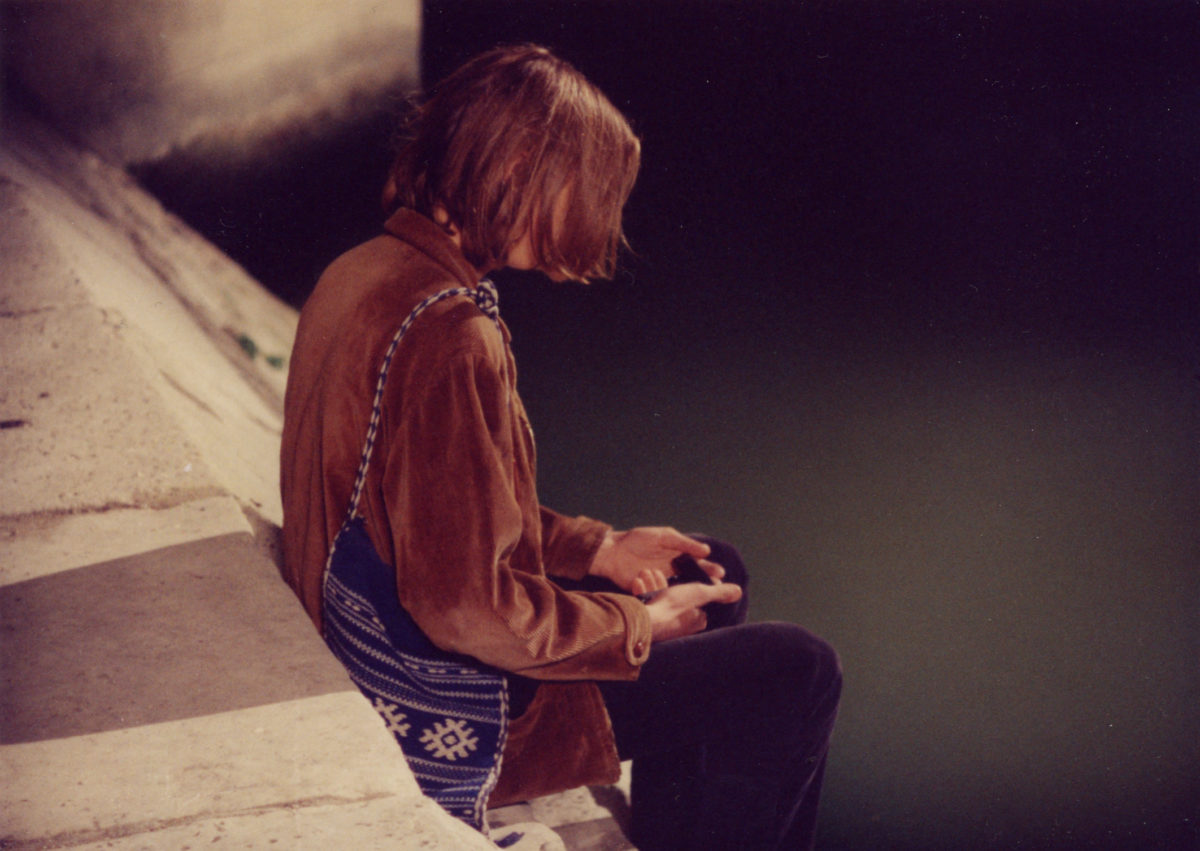
II. The Other Shoe, Perhaps
When Godard starts his second to last feature Adieu au langage with the assurance that “Those who lack imagination, seek refuge in reality” (where the title of this piece comes from), he knows exactly what he is doing, channeling that spirit of May ’68, which famously proclaimed “All power to imagination!”, with which his Nouvelle Vague output has become sort of synonymous. In Le Diable probablement (1977), Bresson, less the revolutionary, thematized his own hangover and through that a whole generation’s, when, despite the big and idly chanted ideals, they broke open the pavement and yet did not find the beach lying beneath, waiting for them.
Once more we get the tale of a death foretold, this time literally when we are shown two newspaper clippings of the suicide at Père Lachaise of our soon-to-be protagonist Charles (Antoine Monnier).
But before all that, shoes come into the picture again. We are instructed into the proper way of walking, not too much to one side or the other, in order for us to not wear down our shoes too much. A scene meaningful in its hermetic ambiguity. Is this supposed to be a metaphor for something greater and, if so, what could be made clear by this? As always, nothing is explained.
In the next couple of days, we will follow our disaffected hero during the events that will lead up to the predicted ending. He drives around in fancy cars, fucks a handful of girls and has conversation with friends of whom we can never be sure what their friendship consists of. Charles is the perfect example of the disillusion of a generation that has been promised freedom but finds the conditions for its possibility no longer present. Freedom seems indeed to be having nothing left to lose, or even more, to see everything being wasted before your own eyes.
The destruction of the environment as a big leitmotiv, literally a guiding motif, for the unspiritual journey of our modern day Raskolnikov. Through images of ocean pollution, the spread of toxic pesticides and insecticides and even the clubbing of seals (in which the much more archaic violence of the rabbit shooting in Mouchette is perversely echoed), we are being made aware that even if Sartre had been right about existence (‘being’) preceding essence (‘meaning’), thereby making us free to shape our own lives, the (ecological) preconditions of this existence need to be safeguarded because otherwise there can be no existential freedom. What Charles is up against is the legacy of his parents and industrialization who have destroyed precisely these bare conditions in which a meaningful life is possible.
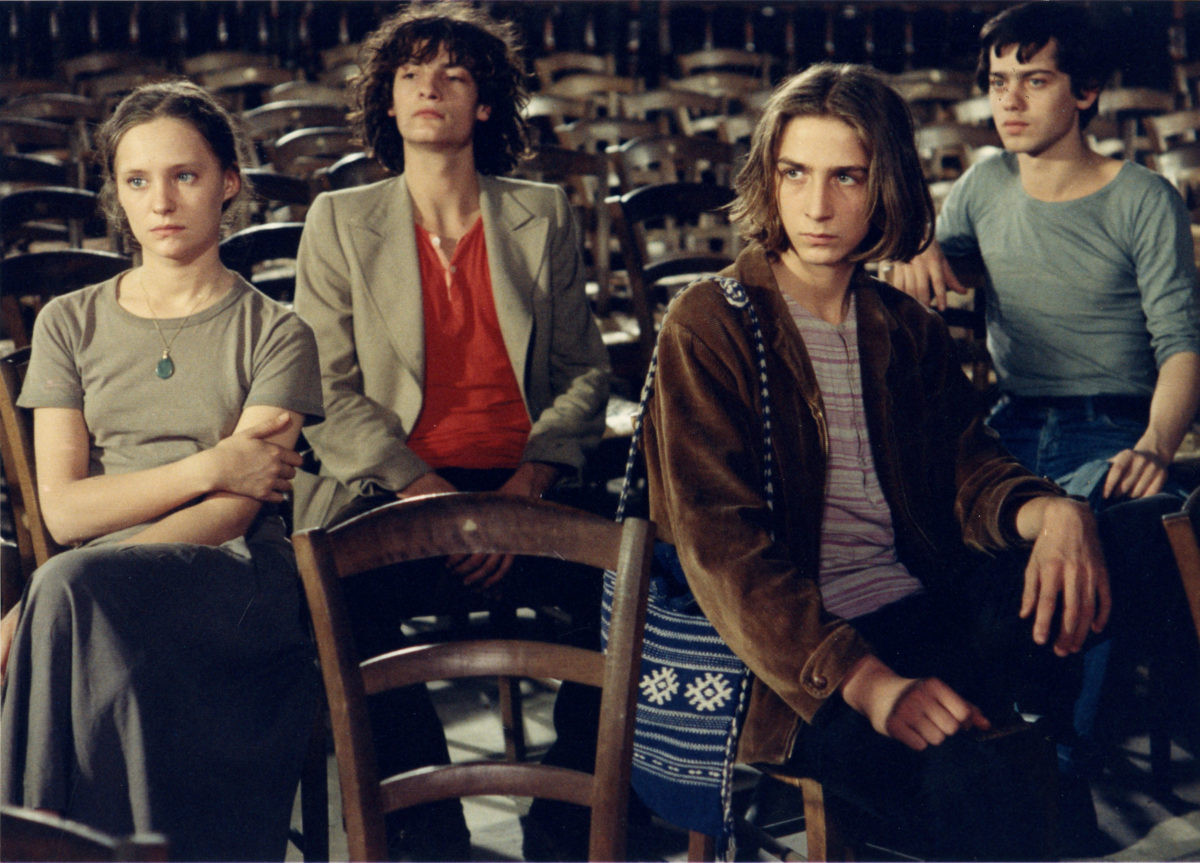
There are almost no adults present in this film. They have left their kids unsheltered. If in Mouchette the heritage was alcoholism and the repetition of the eternal, with Charles we have encountered a young man who is left to his own devices. In the famous public transportation scene, a conversation on politics enrolls where unknown passengers chime in on the question of who is in control of the affairs of the world. Governments can no longer proclaim to be governing anything, the masses have taken over but they are at their turn controlled by irrational forces that no one can take responsibility for. In what Adam Curtis deemed the century of the self the ideas of personal development have been co-opted by both businesses that want economical gain and politics that have tried to coerce the masses into manageable pawns for their game. The result is each party pointing towards the other, screaming they are The Wizard of Oz but each withdrawn curtain showing nothing was hidden all along. The answer that concludes the bus discussion is tellingly transcendental; behind all of this must be the devil, probably.
In a film concerned with the betrayed inheritance of the sixties it might come as a surprise how much of a role has been put out for God. At one point Charles reads out loud the words of Victor Hugo that “a church is divine. God is present, but if a priest appears God is no longer present.” Man has driven God out of his dwelling spot; the nature he had been assigned to preside over. With the destruction of our habitat we become unsheltered. Charles breaks into a church to spend a night alone sleeping there with the music of Monteverdi, seemingly longing for an assuring presence that has left the building.
With society going completely mad, the only logical things to do are refusal and withdrawal. There might be no parents but the authority is present not in the form of the flakey priest who desperately tries to modernize his teachings in order to preserve affiliation with the times that have been chancing, but in the psychiatrist to whom Charles is sent. As a gatekeeper of normality and as such the keeper of the status quo, he tries to make sense of this rebel who lost any cause worth living for. He tries to talk to him in terms of guilt and the coxcombry that might fuel Charles’ behavior, not understanding how his patient rejects the basis on which he is being questioned. If this is society, he does not only refuse to play by its rules, but to play at all. His only pleasure is the pleasure of despair and with his suicide he will only opt out of a life commoditized by consumerism as he makes clear by reading the table of contents of lifestyle magazine.
The freedom that was promised by the Parisian Seizure, as Cees Nooteboom called it, has become a freedom of consumption just as free love has become meaningless fucking. There is still the possibility of tenderness, as witnessed in the encounters with Charles’ girlfriends who really care about him even though arguably they should no longer, but that is not enough. In a world depleted of all meaning, suicide is once again completely meaningless and once again nothing will be redeemed or lost by the death of this young person. In a breathtaking cut between a fully set table ready for dinner and that same table after dinner has taken place, we are reminded of the brevity of life and how only the rubble we leave behind can testify to it.
Le Diable probablement is a story of existential loneliness. Right before he gets shot in the back, in the same way Mouchette could have been saved by the farmer, Charles asks his hired killer if he can tell him …; but the words are drowned out by the sound of the gunshot. Nothing was left to say; enough silence had been wasted.
